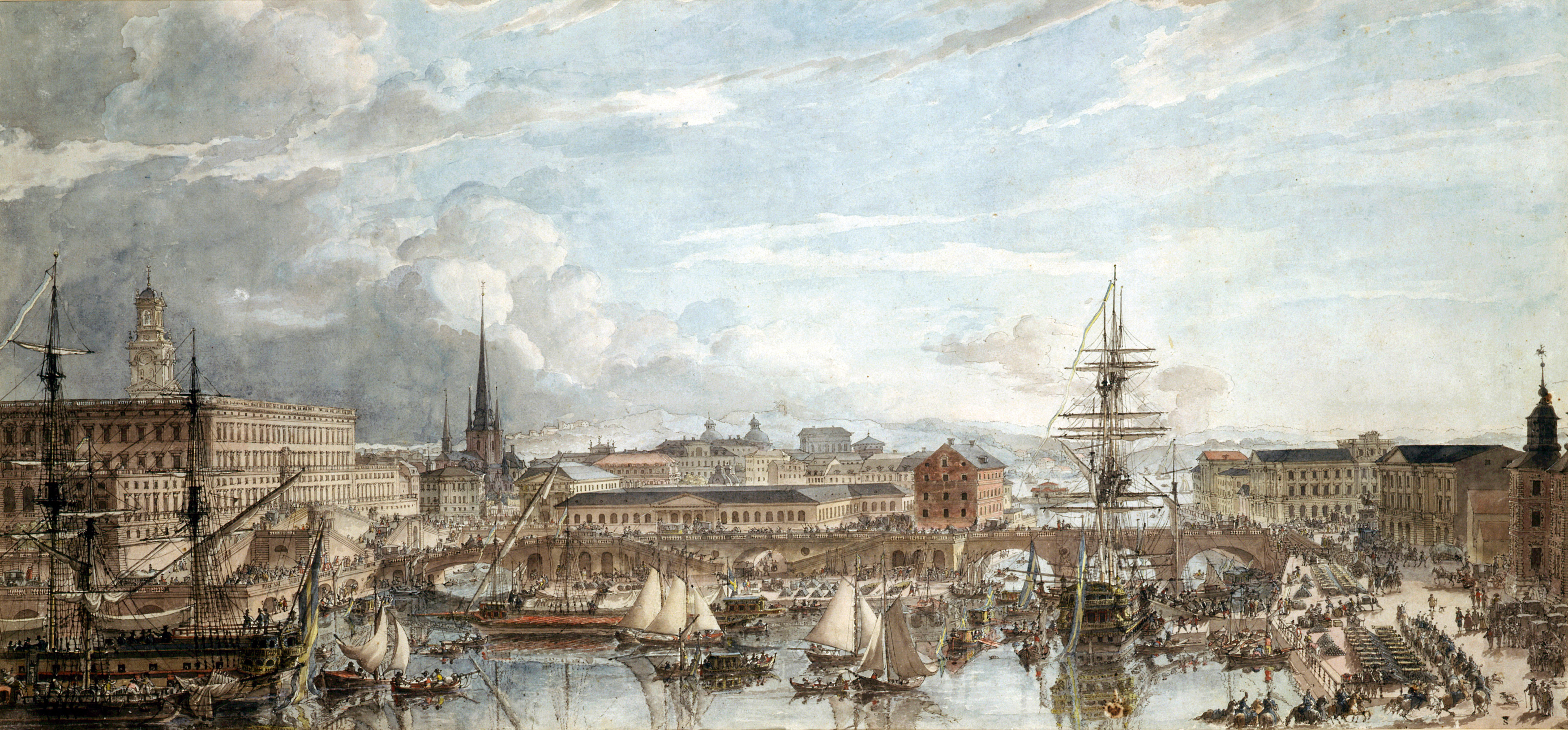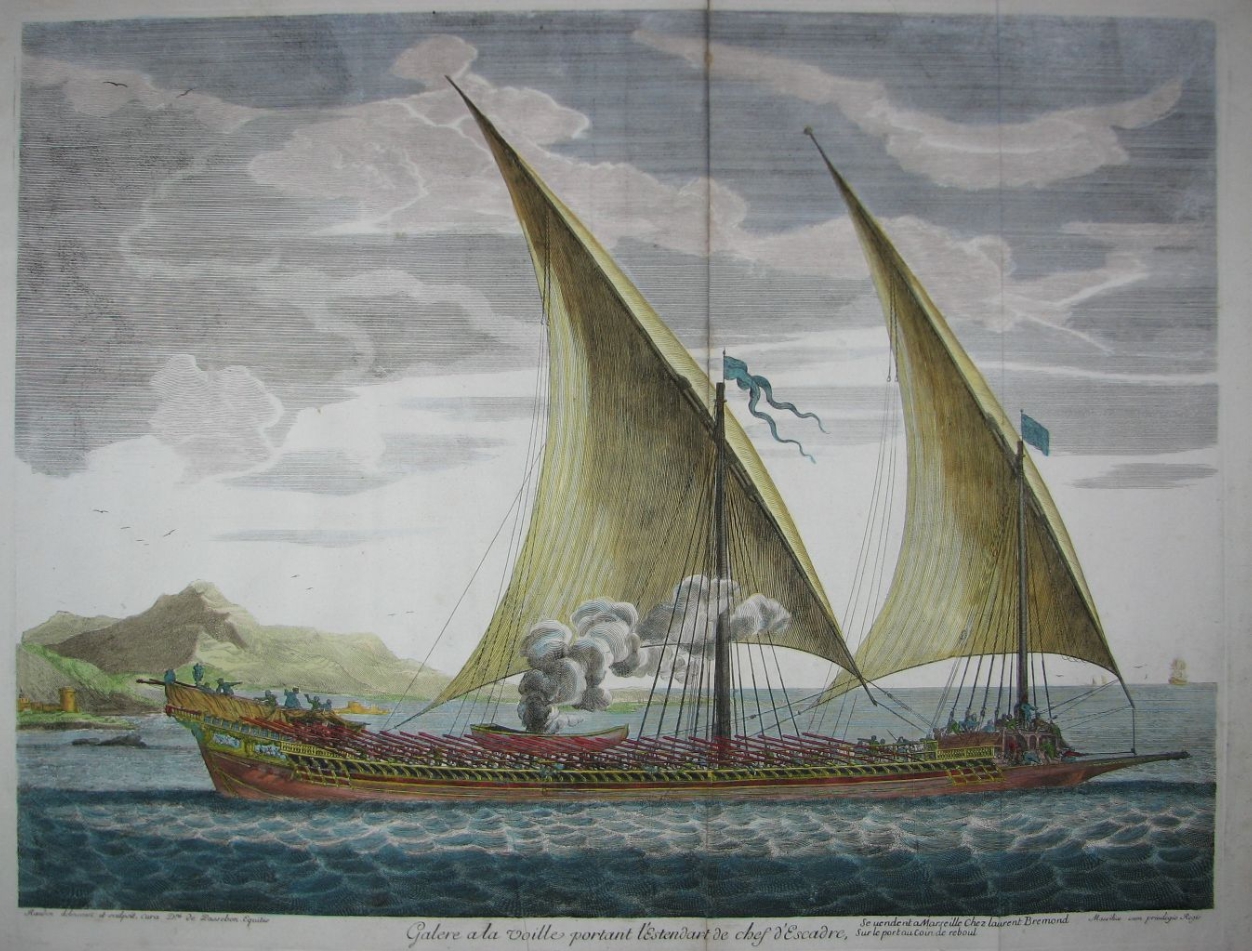|
Battle Of Vyborg Bay (1790)
The Battle of Vyborg Bay (or the Battle of Vyborg) was a naval battle fought between Russian Empire, Russia and Gustavian era, Sweden on 3 July 1790 in Vyborg Bay off the coast of Vyborg during the Russo-Swedish War (1788–1790). The Swedish Navy suffered heavy losses, losing seven ships of the line and three frigates, but Gustav III of Sweden eventually ensured a Swedish naval escape through a Russian naval blockade composed of units of the Baltic Fleet, commanded by Admiral Vasily Chichagov. British historians would later call the Battle of Vyborg Bay the "Baltic Sea, Baltic Battle of Trafalgar, Trafalgar". The battle ranks among the world's largest historical naval battles and also among the most influential, as it introduced the naval battle concept of "firepower over mobility". Background In 1790, King Gustav III revived his plan for a landing close to St. Petersburg, this time near Vyborg, Viborg. But the plan foundered in a disastrous attack on the Russian fleet at the B ... [...More Info...] [...Related Items...] OR: [Wikipedia] [Google] [Baidu] |
Russo-Swedish War (1788–1790)
The Russo-Swedish War of 1788–1790 was fought between Gustavian era, Sweden and Russian Empire, Russia from June 1788 to August 1790. The war was ended by the Treaty of Värälä on 14 August 1790 and took place concomitantly with both the Austro-Turkish War (1788–1791), Russo-Turkish War (1787–1792) and Theatre War. The war was, overall, mostly insignificant for the parties involved. King Gustav III, Gustav III of Sweden initiated the war for domestic political reasons, hoping to gain support from the opposition. Despite forming an alliance with the Ottoman Empire, Sweden failed to secure support from Kingdom of Great Britain, Great Britain, the Dutch Republic, and Kingdom of Prussia, Prussia. Sweden's initial plan to attack Saint Petersburg and instigate a coup to depose Empress Catherine the Great, Catherine II did not materialize. The war led to Denmark–Norway declaring war on Sweden, but peace was eventually signed on 9 July 1789 after diplomatic intervention by Gr ... [...More Info...] [...Related Items...] OR: [Wikipedia] [Google] [Baidu] |
Naval Artillery In The Age Of Sail
The Age of Sail encompasses the period of roughly 1571–1862, when large, sail-powered wooden naval warships dominated the high seas, mounting a large variety of types and sizes of cannon as their main armament. By modern standards, these naval artillery pieces were extremely inefficient, difficult to load, and short ranged. These characteristics, along with the handling and seamanship of the ships that mounted them, defined the environment in which the naval tactics in the Age of Sail developed. Firing Firing a naval cannon required a great amount of labour and manpower. The propellant was gunpowder, whose bulk had to be kept in the magazine, a special storage area below deck for safety. ''Powder boys'', typically 10–14 years old, were enlisted to run powder from the magazine up to the gun decks of a vessel as required. A typical firing procedure follows. A wet swab was used to mop out the interior of the barrel, extinguishing any embers from a previous firing which mi ... [...More Info...] [...Related Items...] OR: [Wikipedia] [Google] [Baidu] |
Battle Of Trafalgar
The Battle of Trafalgar was a naval engagement that took place on 21 October 1805 between the Royal Navy and a combined fleet of the French Navy, French and Spanish Navy, Spanish navies during the War of the Third Coalition. As part of Napoleon's planned invasion of the United Kingdom, the French and Spanish fleets combined to take control of the English Channel and provide the Grande Armée safe passage. The allied fleet, under the command of French admiral Pierre-Charles Villeneuve, sailed from the port of Cádiz in the south of Spain on 18 October 1805. They encountered a British fleet under Horatio Nelson, 1st Viscount Nelson, Lord Nelson, recently assembled to meet this threat, in the Atlantic Ocean along the southwest coast of Spain, off Cape Trafalgar. Nelson was outnumbered, with 27 British ships of the line to 33 Franco-Spanish ships, including the largest warship in either fleet, the Spanish ''Spanish ship Nuestra Señora de la Santísima Trinidad, ... [...More Info...] [...Related Items...] OR: [Wikipedia] [Google] [Baidu] |
Baltic Sea
The Baltic Sea is an arm of the Atlantic Ocean that is enclosed by the countries of Denmark, Estonia, Finland, Germany, Latvia, Lithuania, Poland, Russia, Sweden, and the North European Plain, North and Central European Plain regions. It is the world's largest brackish water basin. The sea stretches from 53°N to 66°N latitude and from 10°E to 30°E longitude. It is a Continental shelf#Shelf seas, shelf sea and marginal sea of the Atlantic with limited water exchange between the two, making it an inland sea. The Baltic Sea drains through the Danish straits into the Kattegat by way of the Øresund, Great Belt and Little Belt. It includes the Gulf of Bothnia (divided into the Bothnian Bay and the Bothnian Sea), the Gulf of Finland, the Gulf of Riga and the Bay of Gdańsk. The "Baltic Proper" is bordered on its northern edge, at latitude 60°N, by Åland and the Gulf of Bothnia, on its northeastern edge by the Gulf of Finland, on its eastern edge by the Gulf of Riga, and in the ... [...More Info...] [...Related Items...] OR: [Wikipedia] [Google] [Baidu] |
Admiral
Admiral is one of the highest ranks in many navies. In the Commonwealth nations and the United States, a "full" admiral is equivalent to a "full" general in the army or the air force. Admiral is ranked above vice admiral and below admiral of the fleet, or fleet admiral. Etymology The word in Middle English comes from Anglo-French , "commander", from Medieval Latin , . These evolved from the Arabic () – () (), "king, prince, chief, leader, nobleman, lord, a governor, commander, or person who rules over a number of people" and (), the Arabic definite article meaning "the." In Arabic, admiral is also represented as (), where al-Baḥr (البحر) means the sea. The 1818 edition of Samuel Johnson's '' A Dictionary of the English Language'', edited and revised by the Rev. Henry John Todd, states that the term "has been traced to the Arab. emir or amir, lord or commander, and the Gr. , the sea, q. d. ''prince of the sea''. The word is written both with and without ... [...More Info...] [...Related Items...] OR: [Wikipedia] [Google] [Baidu] |
Baltic Fleet
The Baltic Fleet () is the Naval fleet, fleet of the Russian Navy in the Baltic Sea. Established 18 May 1703, under Tsar Peter the Great as part of the Imperial Russian Navy, the Baltic Fleet is the oldest Russian fleet. In 1918, the fleet was inherited by the Russian Soviet Federative Socialist Republic, Russian SFSR which then founded the Soviet Union in 1922, where it was eventually known as the Twice Red Banner(ed) Baltic Fleet as part of the Soviet Navy, as during this period it gained the two awards of the Order of the Red Banner. Following the collapse of the Soviet Union in 1991, the Baltic Fleet was inherited by the Russian Federation and reverted to its original name as part of the Russian Navy. The Baltic Fleet is headquartered in Kaliningrad and its main base is in Baltiysk (Pillau), both in Kaliningrad Oblast, while another base is in Kronstadt, Saint Petersburg, in the Gulf of Finland. Imperial Russia The Imperial Russian Baltic Fleet was created during the Gre ... [...More Info...] [...Related Items...] OR: [Wikipedia] [Google] [Baidu] |
Blockade
A blockade is the act of actively preventing a country or region from receiving or sending out food, supplies, weapons, or communications, and sometimes people, by military force. A blockade differs from an embargo or sanction, which are legal barriers to trade rather than physical barriers. It is also distinct from a siege in that a blockade is usually directed at an entire country or region, rather than a fortress or city and the objective may not always be to conquer the area. A blockading power can seek to cut off all maritime transport from and to the blockaded country, although stopping all land transport to and from an area may also be considered a blockade. Blockades restrict the trading rights of neutrals, who must submit for inspection for contraband, which the blockading power may define narrowly or broadly, sometimes including food and medicine. In the 20th century, air power has also been used to enhance the effectiveness of blockades by halting air traffic w ... [...More Info...] [...Related Items...] OR: [Wikipedia] [Google] [Baidu] |
Swedish Navy
The Swedish Navy () is the maritime service branch of the Swedish Armed Forces. It is composed of surface and submarine naval units – the Fleet (), formally sometimes referred to as the Royal Navy () – as well as marine units, the Amphibious Corps (). Founded under King Gustav Vasa in 1522, the Swedish navy is one of the oldest continuously serving navies in the world, celebrating its 500th anniversary in 2022. History Early Swedish kings ( 9th–14th centuries) organised a Swedish Navy along the coastline through . This involved combined rowing and sailing ships (without artillery). This system became obsolete with the development of society and changes in military technology. No later than in the 14th century, the duty to serve in was replaced by a tax. In 1427, when Sweden was part of the Kalmar Union (with Denmark and Norway), Swedish warships did however participate in the naval battle of Öresund against the Hanseatic League. It is unclear how this force was ... [...More Info...] [...Related Items...] OR: [Wikipedia] [Google] [Baidu] |
Gustavian Era
The history of Sweden from 1772 to 1809 is better known as the Gustavian era of kings Gustav III and Gustav IV Adolf, as well as the reign of King Charles XIII. Gustav III Adolf Frederick of Sweden died on 12 February 1771. The elections afterward resulted in a partial victory for the Caps party, especially among the lower orders; but in the estate of the peasantry the Caps majority was merely nominal, while the mass of the nobility was dead against them. Nothing could be done, however, till the return of the new king, Gustav III, from Paris. Coronation oath The new coronation oath contained three revolutionary clauses: #The first aimed at making abdications in the future impossible by binding the king to reign uninterruptedly. #The second obliged him to abide, not by the decision of all the estates together, as heretofore, but by that of the majority only, with the view of enabling the actually dominant lower estates (in which there was a large Cap majority) to rule ... [...More Info...] [...Related Items...] OR: [Wikipedia] [Google] [Baidu] |
Naval Battle
Naval warfare is combat in and on the sea, the ocean, or any other battlespace involving a major body of water such as a large lake or wide river. The armed forces branch designated for naval warfare is a navy. Naval operations can be broadly divided into riverine/littoral applications (brown-water navy), open-ocean applications (blue-water navy), between riverine/littoral and open-ocean applications (green-water navy), although these distinctions are more about strategic scope than tactical or operational division. The strategic offensive purpose of naval warfare is projection of force by water, and its strategic defensive purpose is to challenge the similar projection of force by enemies. History Mankind has fought battles on the sea for more than 3,000 years. Even in the interior of large landmasses, transportation before the advent of extensive railways was largely dependent upon rivers, lakes, canals, and other navigable waterways. The latter were crucial in the developm ... [...More Info...] [...Related Items...] OR: [Wikipedia] [Google] [Baidu] |
Galley
A galley is a type of ship optimised for propulsion by oars. Galleys were historically used for naval warfare, warfare, Maritime transport, trade, and piracy mostly in the seas surrounding Europe. It developed in the Mediterranean world during Classical antiquity, antiquity and continued to exist in various forms until the early 19th century. It typically had a long, slender hull, shallow draft (hull), draft, and often a low freeboard (nautical), freeboard. Most types of galleys also had sails that could be used in favourable winds, but they relied primarily on oars to move independently of winds and currents or in battle. The term "galley" originated from a Greek term for a small type of galley and came in use in English from about 1300. It has occasionally been used for unrelated vessels with similar military functions as galley but which were not Mediterranean in origin, such as medieval Scandinavian longships, 16th-century Ghali (ship), Acehnese ghalis and 18th-century North ... [...More Info...] [...Related Items...] OR: [Wikipedia] [Google] [Baidu] |
Mattila
Mattila is a Finnish surname. Notable people with the surname include: * Hanna-Leena Mattila (born 1968), Finnish politician *Jaakko Mattila (born 1976), Finnish painter * Jarno Mattila (born 1984), Finnish footballer *Karita Mattila (born 1960), opera soprano * Olavi J. Mattila (1918–2013), Finnish Trade and Industry Ministry official *Pertti Mattila Pertti Esko Juhani Mattila (born 28 March 1948) is a Finnish mathematician working in geometric measure theory, complex analysis and harmonic analysis. He is Professor of Mathematics in the Department of Mathematics and Statistics at the Univer ... (born 1948), Finnish mathematician * Pirkko Mattila (born 1964), Finnish politician * Risto Mattila (born 1981), Finnish snowboarder * Sakari Mattila (born 1989), Finnish footballer * Topi Mattila (born 1946), Finnish ski jumper * Ville Mattila (1903–1987), Finnish cross country skier {{surname Patronymic surnames Finnish-language surnames ... [...More Info...] [...Related Items...] OR: [Wikipedia] [Google] [Baidu] |









